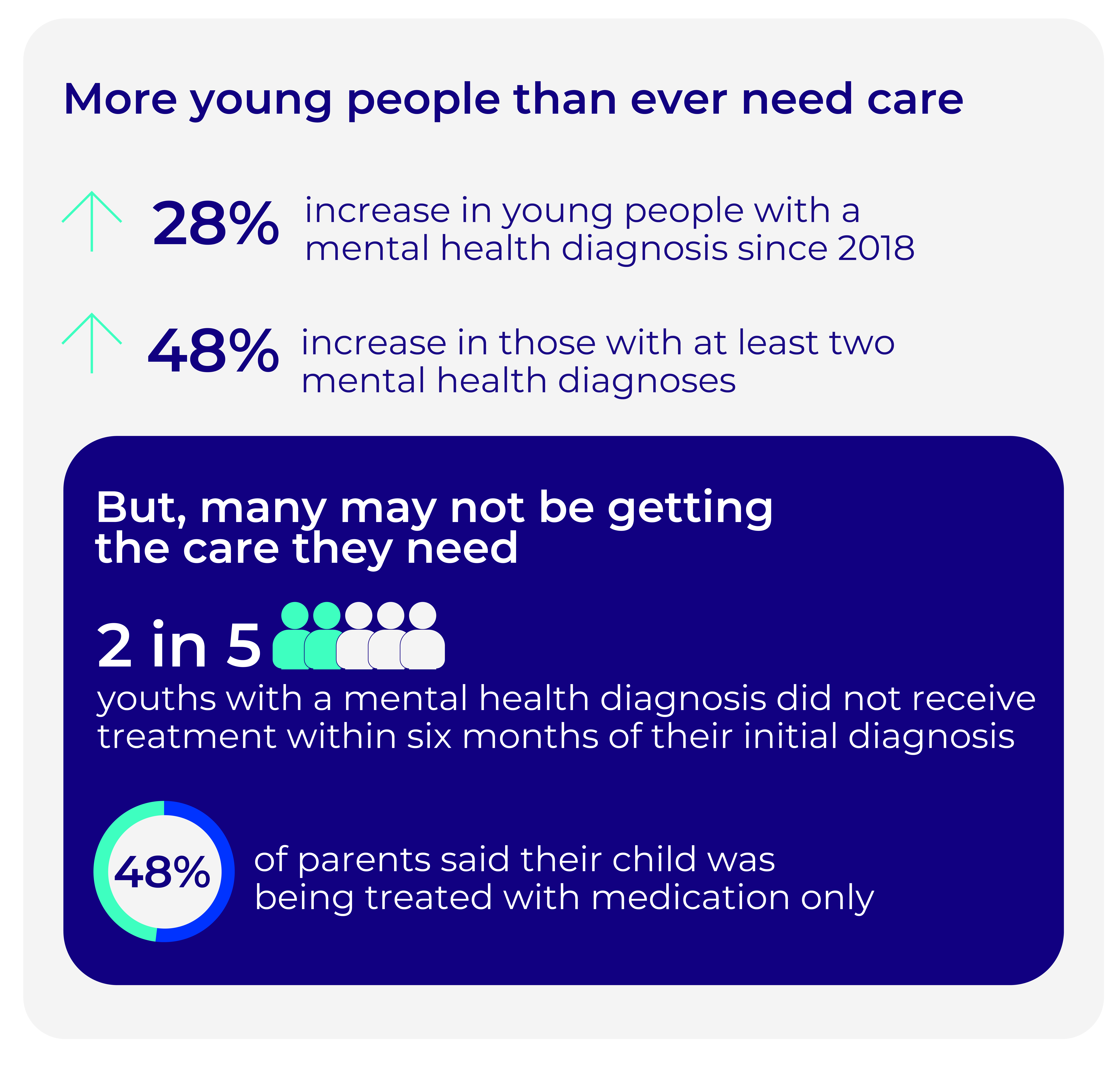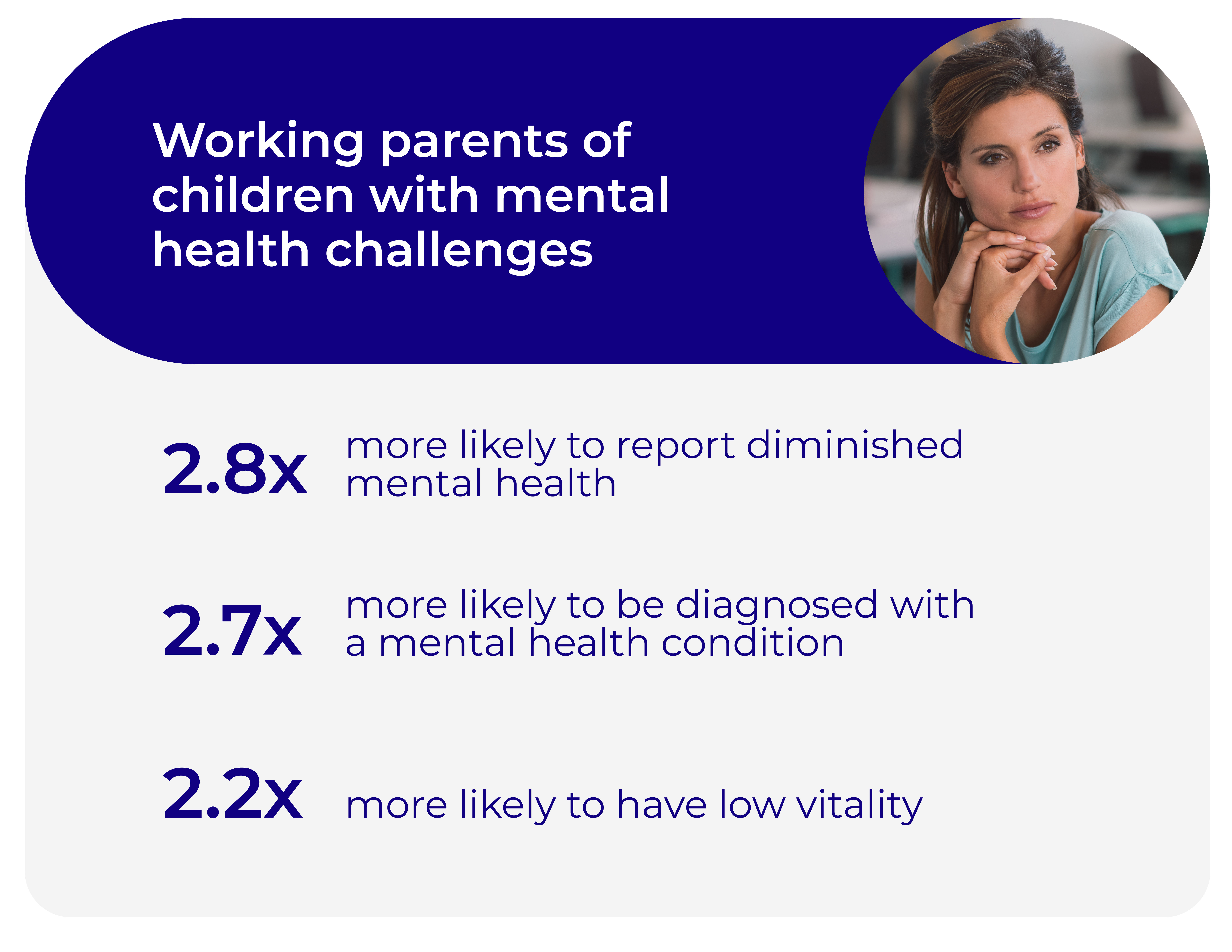
The number of American children struggling with mental health challenges post-pandemic continues to rise, and many are not receiving optimal behavioral health care. Those are among the key findings of new research from Evernorth, the health services business of The Cigna Group, which shows the significance of the mental health crisis, the challenges parents face, and how employers can strengthen their approach to behavioral health care and services to better support parents.
(Click here to download the full research)
The ripple effect extends beyond parents and families to schools, workplaces, and communities. The overall estimated annual cost to the U.S. economy due to behavioral health conditions is close to $900 billion.
“Curbing the youth mental health crisis and its human and economic toll is imperative for a thriving, vital society.” David M. Cordani, chairman and CEO, The Cigna Group
“While much of the focus has centered on the intersection of parents, schools and care providers, there is a unique role that employers play. Collaborating with employers, as powerful enablers of health and vitality through workplace benefits, culture, and community engagement, we can change the trajectory of this crisis,” Cordani said.
Read on to explore the key findings of this timely new research.
The current state of youth mental health in America
The Evernorth Research Institute analyzed the anonymized data of 20 million commercially insured people under the age of 26 and found an increase in both prevalence of mental health conditions in youths as well as an increase in treatment. From 2018 through 2022, the number of young people with a mental health diagnosis increased 28%. The number of young people with at least two mental health diagnoses increased 48%.
The analysis also revealed a concerning trend: Many young people are not receiving the full spectrum of behavioral care. One in five young people newly diagnosed with acute stress disorders, ADHD, anxiety, or depression did not receive behavioral health follow-up care within three months of initial diagnosis. In 2022 alone, 38% did not receive treatment within six months of initial diagnosis.

Of those who received treatment, a significant number were treated with medication only, including nearly 27% of those diagnosed with ADHD and 21% of those with depression. According to the American Academy of Child and Adolescent Psychiatry, medication use in children should be considered as part of a holistic and collaborative mental health treatment plan.
Every young person is different, and individual treatment plans determined by care providers and parents are different. However, when youths are receiving medication only, there is evidence that adding therapy – individual or family – could provide an opportunity to improve and sustain health outcomes.
The mental health of young people impacts their parents’ health, well-being, and productivity at work
The more time a parent spends caring for a child’s mental health needs, the greater the disruption to their work and productivity. It is estimated that indirect costs related to mental health such as lost productivity cost employers $47.6 billion annually.
To better understand the challenges facing parents, Evernorth commissioned YouGov to survey 2,500 U.S. parents. Working parents managing a child’s mental health needs reported a significant impact, personally and professionally. Compared to working parents of children who do not have mental health challenges, they are far more likely to have mental health struggles of their own, with 54% reporting a diagnosed condition.

Parents reporting diminished mental health find their jobs significantly more stressful, are less enthusiastic about work, and are less confident in their ability to carry out their job duties. Just 40% are satisfied with their job, compared to 71% of parents who describe their own mental health as strong despite their child’s mental health challenges.
The need for connected, evidence-based behavioral health care
More than half of working parents (55%) experienced challenges obtaining care for their child, and 36% of parents reported that access barriers were the reason their child was not receiving counseling or therapy. They reported difficulties finding a provider, getting an appointment within a reasonable time frame, and affording care.
Several studies show that quality, evidence-based behavioral health care can improve outcomes and reduce costs. In one study, employees who participated in an evidence-based workforce mental health program had more mental health visits but significantly lower costs for medical, pharmacy, and behavioral health care than the comparison group. Another study found that people who used an evidence-based mental health benefit were less likely to leave the company compared to those that did not.
Ensuring quick access to quality care that integrates medical, pharmacy, and mental health care facilitates early identification, strengthens interventions, supports synergy in therapy and medication utilization, and drives improved outcomes and cost savings. This includes providing parents with guidance and care navigation resources so they can get their child the right level of care to address their unique needs when they need it.
How employers can better support parents managing youth mental health challenges
U.S. employers, which provide health insurance and benefits for 155 million people, are well positioned to drive change by providing benefits, services, support, and a workplace culture that makes managing their child’s mental health issues easier. When workplace culture supports family mental health, parents can focus on their children’s needs while better managing work responsibilities.
The research outlined four key areas of opportunity for employers to drive better behavioral health outcomes: care delivery, customization, culture, and community engagement.
The Cigna Group is committed to improving youth mental health
Across The Cigna Group, we’re partnering with stakeholders throughout the health ecosystem to enact real change and improve youth mental health. The Cigna Group has increased the number of behavioral health specialists within its Cigna Healthcare and Evernorth Health Services businesses who specialize in treating younger people by 54% since 2021. We’ve made important progress expanding access to evidence-based, quality, in-network therapy for millions of people through the Evernorth Behavioral Care Group, launching an innovative measurement-based care program for our behavioral health network, expanding and promoting utilization of virtual care, and advocating for self-identification in specialty areas including those working with children and teens.
We know this impact cannot be made through health care and services alone. We need to engage young people in the communities where they live, play, and learn. The Cigna Group launched a multi-year philanthropic and community engagement initiative to improve youth mental health as it relates to post-pandemic acute stress and distress. This commitment includes support for those who care for youths in everyday settings and interactions, such as parents, caregivers, and educators.
Through this commitment, we will look to support a range of nonprofit organizations through foundation grants and corporate giving sponsorships. This includes our partnership with the YMCA through a previously committed multi-year grant, which offers specific programming for teens in Houston and Memphis, and our new partnership with the Boys & Girls Clubs of America.

Employers can curb the youth mental health crisis
New research looks at the state of youth mental health, challenges their parents face, and how employers can help.
